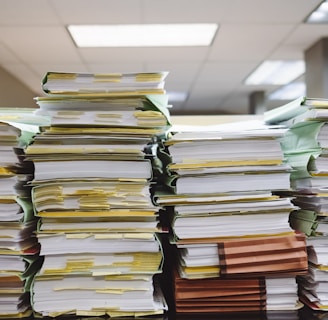The Importance of Collecting and Keeping Accurate Records: Your Financial Foundation
Learn why collecting and keeping accurate records of receipts and spending is crucial for financial clarity, tax compliance, and business success.
Charles Etgen
8/16/20242 min read


📂 The Importance of Collecting and Keeping Accurate Records: Your Financial Foundation
When it comes to managing your business finances, the importance of collecting and keeping accurate records of receipts and spending cannot be overstated. These records are the backbone of your financial system, providing the data needed to maintain accurate books, manage cash flow, and comply with tax regulations. Let’s dive into why this practice is essential and how to make it a seamless part of your business operations.
Why Accurate Record-Keeping Matters
Tax Compliance: Keeping detailed records of your expenses is crucial for tax time. The IRS requires businesses to have proper documentation to substantiate deductions. Without accurate receipts, you risk losing valuable deductions or facing penalties in the event of an audit.
Financial Clarity: By maintaining a complete record of all your spending, you gain a clear picture of your business’s financial health. This clarity allows you to track expenses, monitor cash flow, and make informed financial decisions that can lead to cost savings and better resource allocation.
Expense Management: Accurate records help you categorize and analyze your spending patterns. Understanding where your money is going enables you to identify areas for cost-cutting, optimize your budget, and ensure that your spending aligns with your business goals.
Audit Preparedness: If your business is ever audited, having organized, accurate records will make the process smoother and less stressful. Proper documentation shows that you’re running a compliant and transparent operation, reducing the risk of penalties and fines.
Tips for Effective Record-Keeping
Digitize Your Receipts: Use a scanner or a mobile app to digitize paper receipts immediately after a purchase. This practice not only saves space but also ensures that your records are easily accessible and less likely to be lost.
Categorize as You Go: Instead of waiting until the end of the month, categorize your receipts and expenses as they occur. This habit makes it easier to keep your books up to date and ensures that nothing slips through the cracks.
Use Cloud-Based Storage: Store your digital receipts and records in a secure, cloud-based system. This setup allows you to access your records from anywhere and ensures that they’re protected from physical damage or loss.
Regularly Review Your Records: Set aside time each week or month to review your spending records. This practice helps you catch any discrepancies early and ensures that your records remain accurate and organized.
Final Thoughts
Collecting and keeping accurate records of your receipts and spending is more than just a good habit—it’s a critical aspect of financial management that can protect your business, save you money, and give you peace of mind. By staying on top of your records, you’ll have the information you need to make informed decisions and keep your business on a solid financial footing.
Need help setting up an efficient record-keeping system? Let’s connect and discuss how I can support your business with professional bookkeeping services.
#Bookkeeping #RecordKeeping #ExpenseManagement #SmallBusiness #FinancialHealth
Services
Customized bookkeeping solutions for your business needs.
Call, text or email me Now
Support
Charles@etgenbookkeeping.com
© 2024. All rights reserved.
Or Click the Button Below to Schedule A Time That's Most Convenient For You!
570-730-9232
Here are my social media links at the moment:
